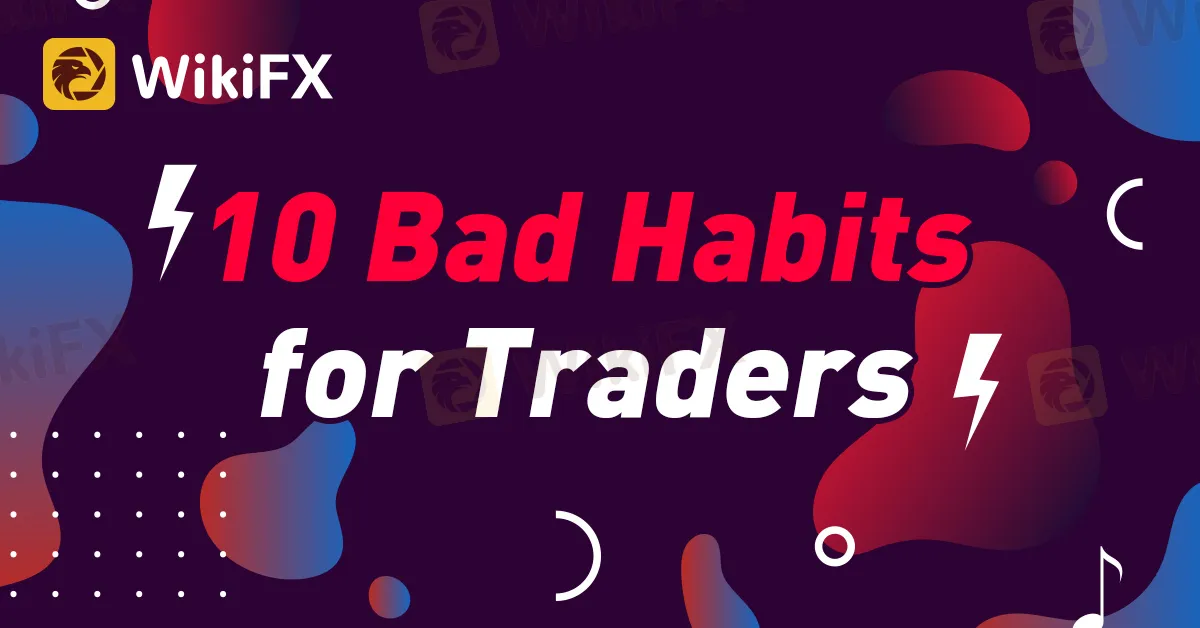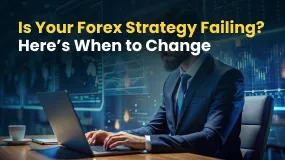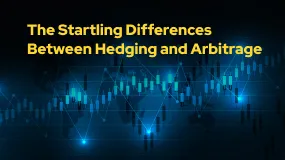简体中文
繁體中文
English
Pусский
日本語
ภาษาไทย
Tiếng Việt
Bahasa Indonesia
Español
हिन्दी
Filippiiniläinen
Français
Deutsch
Português
Türkçe
한국어
العربية
10 Bad Habits for Traders
Abstract:Forex trading can be a highly lucrative venture, but it's also riddled with potential pitfalls. To avoid falling into the trap of bad trading habits, it's essential to be aware of what not to do. Here are ten habits that can lead to failure in forex trading.

Forex trading can be a highly lucrative venture, but it's also riddled with potential pitfalls. To avoid falling into the trap of bad trading habits, it's essential to be aware of what not to do. Here are ten habits that can lead to failure in forex trading.
Lack of Education: Bad traders often enter the market without sufficient knowledge. They fail to understand the intricacies of forex trading, leading to poor decision-making and costly mistakes.
Emotional Trading: Bad traders allow their emotions to dictate their trading decisions. Fear and greed drive impulsive trading, leading to losses and a lack of consistency.
Overtrading: Trading excessively without proper analysis is a common habit among unsuccessful traders. They are often chasing quick profits, leading to excessive risk-taking and a higher chance of failure.
Ignoring Risk Management: Bad traders neglect risk management practices, leading to significant losses. They fail to use stop-loss orders, fail to diversify their portfolios, and risk more than they can afford to lose.
Lack of Patience: Impatient traders jump into trades without waiting for proper confirmation. They lack the discipline to wait for high-probability setups, leading to poor trade entries.
Failure to Adapt: The forex market is dynamic, and bad traders fail to adapt to changing conditions. They stick to outdated strategies, ignore market trends, and refuse to learn from their mistakes.
Blaming External Factors: Bad traders often blame external factors for their losses instead of taking responsibility for their decisions. They attribute losses to market manipulation or broker scams instead of analyzing their own trading mistakes.
Neglecting Analysis: Successful trading requires thorough analysis, but bad traders neglect this aspect. They rely on tips, rumors, or hearsay instead of conducting proper technical and fundamental analysis.
Lack of Record Keeping: Bad traders fail to maintain a trading journal, depriving themselves of valuable insights. They repeat the same mistakes without learning from them, leading to a cycle of losses.
Falling for Scams: Bad traders often fall victim to forex trading scams. They trust unregulated brokers promising unrealistic returns or engage in pyramid schemes that ultimately lead to financial ruin.
To avoid these bad habits, it's crucial to be mindful of your trading decisions, educate yourself, and seek reliable sources of information. One such platform is WikiFX, which provides comprehensive information about forex brokers and user reviews to help traders make informed choices. Visit www.wikifx.com for valuable resources that can protect you from scams and guide you towards successful trading practices.

Disclaimer:
The views in this article only represent the author's personal views, and do not constitute investment advice on this platform. This platform does not guarantee the accuracy, completeness and timeliness of the information in the article, and will not be liable for any loss caused by the use of or reliance on the information in the article.
Read more

Spread vs Swap: How Can They Affect Your Trading
In forex trading, success is not only about predicting price movements correctly. It also depends on understanding the costs involved. Two of the most important charges that every trader should factor in are the spread and the swap. These are key components of the overall forex trading fee charged by brokers, and both can have a direct impact on the outcome of a trade.

Exploring the Benefits of Forex Investments
The Indian forex market is $60 billion strong, courtesy of the belief that it yields significant returns for investors over time. The visually impressive technical analytic tools give investors an insight into the market behavior. Assessing it through varying currency price movements helps them take an informed call on position and account sizes. Explore this article to know the benefits of forex investments in greater detail.

Is Your Forex Strategy Failing? Here’s When to Change
Have you been encountering frequent forex losses? Finding it hard to gain the trading momentum? Can’t understand whether your current forex strategy is in line with the shift in economic indicators or the geopolitical climate? Overcomoming these will require a change to your forex investment strategy. Learn those smart strategic changes here.

The Startling Differences Between Hedging and Arbitrage
The two risk management investment tools - hedging vs arbitrage - have been helping investors achieve their respective financial goals. Explore this comparision to understand their functionalities, the investment purpose they serve, the risk attached, and several other aspects.
WikiFX Broker
Latest News
Global week ahead: Crunch time for trade talks as Trump's deadline nears
Top Wall Street analysts recommend these dividend stocks for regular income
Stock futures rise as U.S.-EU trade deal kicks off a hectic week for markets: Live updates
Samsung Electronics signs $16.5 billion chip-supply contract; shares rise
Does XS.com Hold Leading Forex Regulatory Licenses?
European stocks set to rise after the U.S. and EU strike trade agreement
Elon Musk confirms Tesla has signed a $16.5 billion chip contract with Samsung Electronics
Chile Bumps Up Copper Price Forecast and Flags Lagging Collahuasi Output
Bitget Lists Caldera for Spot Trading | What Should You Know?
Treasury yields tick lower as investors look ahead to Fed's interest rate decision
Currency Calculator


